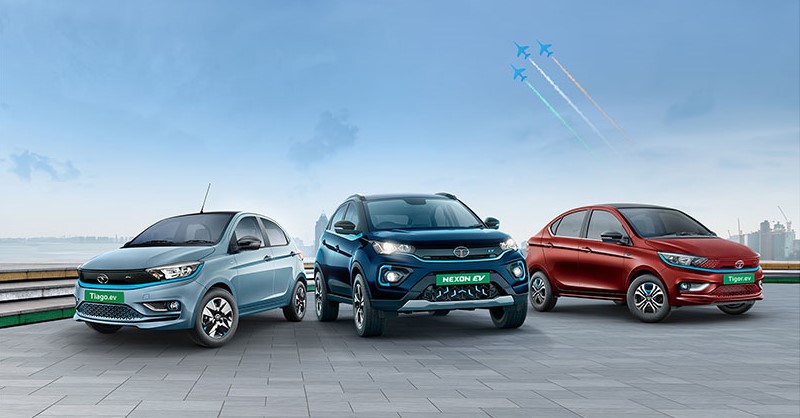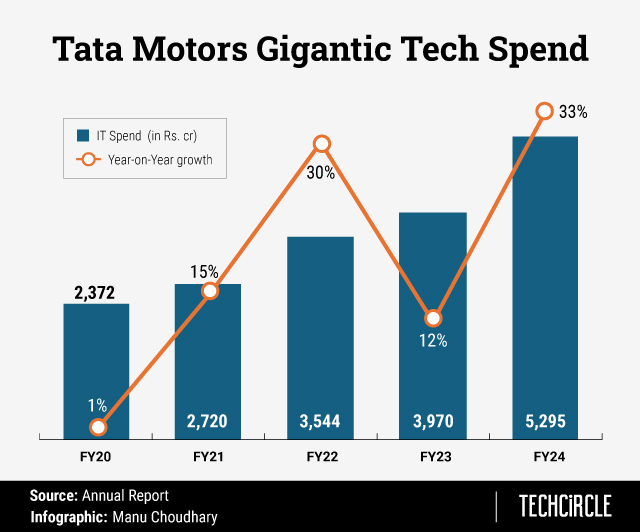
Spend-IT: Tata Motors' tech budget crosses ₹5,000 cr mark for the 1st time


Tata Motors, a part of the $165 billion Tata Group, has increased its technology spending by 33% to ₹5,295 crore, reaching a milestone of exceeding ₹5,000 crore in technology investments for the first time.
On August 1, the Mumbai-based automaker announced that its consolidated revenue had climbed to ₹1.08 lakh crore in the quarter ended June 2024, which is 6% higher compared to ₹1.02 lakh crore in the same period last year. According to the company, this growth is driven by a strong portfolio of products and sales strategy, along with robust technology. The auto major is further investing ₹43,000 crore in products and technologies in 2024-25, slightly exceeding the ₹41,200 crore investments made in FY24.
While Tata Motors claims to be a pioneer in tech innovation, in the last 3-4 years, especially since the pandemic, the company has implemented several digital initiatives to enhance operational efficiency, improve customer experience, and streamline processes to reduce turnaround time and boost productivity. To control costs, it also focuses on specific cost-reduction strategies to increase profitability. Tata Motors’ tech spending has also increased from ₹3544 crore in FY22 to ₹3970 crore in FY23 and a whopping ₹5295 crore in FY24, as per the company’s annual reports.

Last year, Tata Motors initiated a structural shift to integrate digital acceleration through Artificial Intelligence (AI) and Machine Learning (ML). With an increased focus on data analytics, cloud computing, cybersecurity, and vehicle network security, the company is enhancing its supply chain, transforming its approach from reactive to predictive, thus improving transparency and risk management.
In 2023, Tata Motors announced that it is leveraging Microsoft’s connected vehicle technologies that bring together AI/ML and IoT capabilities on the global hyper-scale Azure cloud, to create a highly personalized, smart, and safer driving experience.
The company has also devised the ‘Future of Workplace’ strategy to address rapid technological changes and evolving market demands, equipping its workforce with new skills in Mechatronics, Auto Electronics, and Vehicle Communication. This includes upskilling its permanent employees in these areas.
Tata Motors' new designs, manufacturing processes, supply chain management, and downstream activities like sales and marketing now rely on advanced technologies and digitalization. All of its commercial electric vehicles (EVs), medium and heavy trucks, and buses come Fleet Edge-ready with embedded 4G SIMs, the company said.
The company also said that it supports 21 Information Security Management System (ISMS) policies, subject to annual reviews and audits. The company also promotes cybersecurity awareness through its iProtect program and E-module training.
Emerging technologies that were once peripheral are now central to its operations. For example, Tata Motors is addressing electric vehicle range anxiety—an obstacle to EV adoption in India—using advanced technologies.
Additionally, Tata Motors has partnered with Tata Consultancy Services (TCS) and Tata Technologies to expedite its digital strategy through cloud migration, cybersecurity, and data services. This collaboration has enabled the implementation of cloud-based Enterprise Resource Planning (ERP) solutions, enhancing operations for employees and suppliers alike.
The company has also committed to reducing greenhouse emissions by 46% in its operations and by 54% per vehicle across its entire value chain by 2030, aiming to achieve carbon net zero goals by 2039. Additionally, it has inaugurated two research and development (R&D) facilities focused on sustainable mobility solutions, including an engine test for developing Hydrogen ICEs and infrastructure for hydrogen fuel storage and dispensing for Fuel Cell and H2ICE vehicles.
